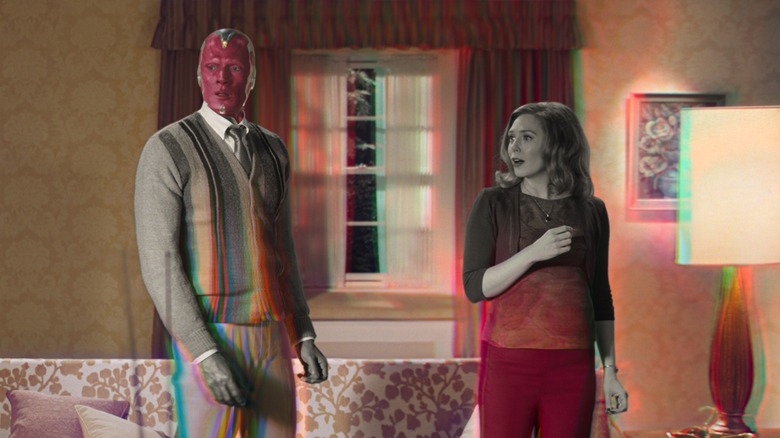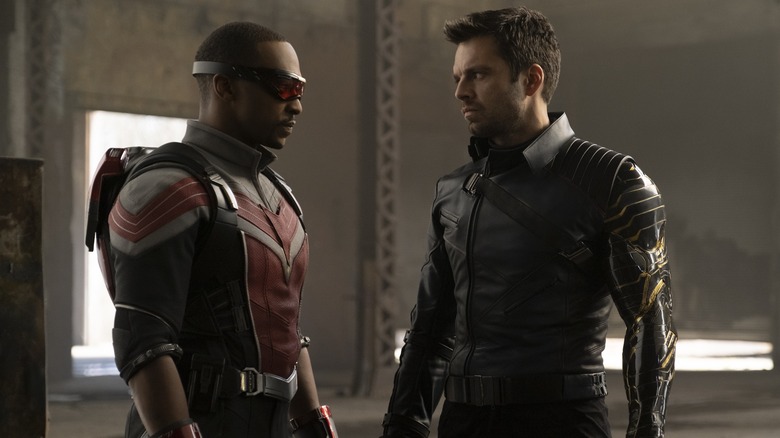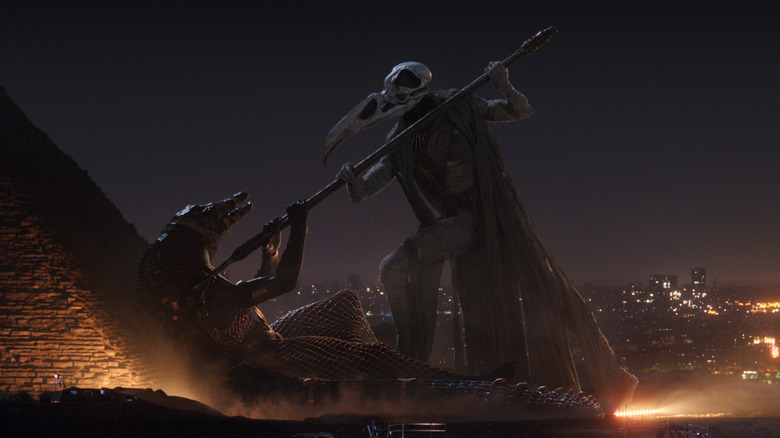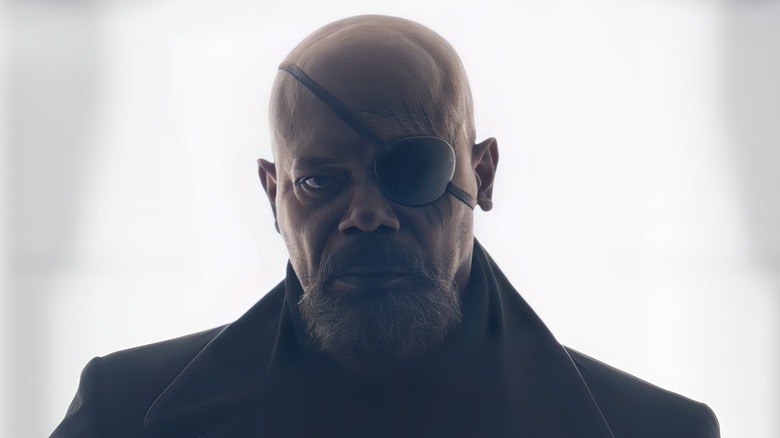Every Live-Action MCU Disney+ Show Has The Exact Same Problem (And How Secret Invasion Can Avoid It)
The studio that hyper-serialized cinema can't seem to stick the landing with regular, serialized television.
In 2021, the Marvel Cinematic Universe branched into episodic TV with "WandaVision" and, because Marvel is nothing if not ambitious, has since cranked out "The Falcon and the Winter Soldier," "Loki," "Hawkeye," "Moon Knight, "Ms. Marvel," and "She-Hulk: Attorney at Law," all of which are canon to the MCU's larger story in a way that Netflix's pocket universe never got to be. And that's important because Marvel wants these shows to be important, so it's frustrating to see every single one of them, like cosmically doomed clockwork, stumble at the finish line. For whatever reason, Marvel has yet to create a satisfying Disney+ series finale.
And that's super weird, because Marvel clearly understands the power of a great conclusion. With "Endgame," the narrative culmination of over 20 feature films, the MCU services all of the stories that came before. We can debate whether or not those stories were wrapped correctly or handled with respect but the point still stands — they were addressed, which is a level of interconnection the live-action Disney+ shows lack in their final episodes. By the way, note that this doesn't apply to the animated MCU Disney+ shows. "What If...?" is an anthology series which, ironically, nails a cohesive ending, and "I Am Groot" is a short collection of Groot-themed vignettes.
These live-action MCU shows have genuinely great moments with genuinely great actors ... they just keep imploding in the final episode. What's going on here, exactly?
Narrative bloat is obscuring the MCU Disney+ shows' ability to deliver impactful finales
Marvel's television endeavors might fair better if they weren't required to introduce new elements in every single episode. These elements tend to become the central focus of their respective episodes in a way that precludes any exploration of previous narrative beats ... and then the cycle repeats. Consider "The Falcon and the Winter Soldier," which explores a racially charged political landscape that is adamantly against Sam Wilson (Anthony Mackie), a Black man, taking over the mantle of Captain America. The show promises to explore themes of racism, white privilege, and PTSD.
And somewhere in the middle, it becomes the "Hey, Zemo can dance good" show. Look, Daniel Brühl makes Helmut Zemo a compelling character who's fun to watch, but his presence overshadows the story with a side quest to Madripoor, which then leads "TFATWS" on a tangent through Agent Sharon Carter's disillusionment with working for the American Government and S.H.I.E.L.D. Also, the Dora Milaje are there, in case anyone forgot that Bucky Barnes (Sebastian Stan) spent time in Wakanda. Oh, and how could we forget Valentina Allegra de Fontaine (Julia Louis-Dreyfus)?
None of these aspects were really explored long enough to make an impact in the finale, which should have seen two of Marvel's best onscreen characters shine like the stars they are. "TFATWS" could have sat with Sam and Bucky and stewed in their rivalry with each other. It could have kept the heat on John Walker (Wyatt Russell), who's set up to be an incredible villain masquerading as a hero. Instead, they team up with Captain Anger Issues, who's suddenly chill, actually, to fight Karli Morganthau (Erin Kellyman), who never should have been promoted to primary antagonist status.
The MCU Disney+ shows are trading tonally and thematically appropriate finales for blockbuster spectacle
When that same critical lens is turned on the rest of the MCU's Disney+ catalog, a pattern emerges. "Loki" is so disjointed that even Tom Hiddleston couldn't save it, leaving its final twist wholly unearned. "Hawkeye" rerouted its consequences-of-being-an-assassin plot to enjoy a light jaunt through the ren faire. And while "Ms. Marvel" forgot to film an episode with the core family getting back on speaking terms, it did spend its entire finale pretending as though it had. The "She-Hulk: Attorney at Law" finale gets a little slack in this department in that it's intentionally more episodic and less connected, but it still suffers from narrative whiplash. And its finale addresses the issues by ignoring them, which is both comparatively clever and deeply frustrating.
But even the most structurally cohesive shows fail to deliver solid conclusions because, at the end of the day, Marvel isn't treating its television shows like television shows. Aside from "She-Hulk," these shows watch like six-hour-long Marvel films, which always end in blockbuster bluescreen brawls. "WandaVision" sidelined Vision (Paul Bettany) and transformed the battle between Wanda Maximoff (Elizabeth Olsen) and Agatha Harkness (Kathryn Hahn) from this sinister thing into a standard laser fight. And "Moon Knight" saw its psychological conflict switched out for an honest-to-gods kaiju battle.
Television conflict is at its best when it tonally and thematically matches the characters involved. Does that mean that some finales will still become massive spectacles? Absolutely. But it also means that others won't. And, honestly, the "Hawkeye" finale came dangerously close to being exactly what the show needed, were it not for the Wilson Fisk (Vincent D'Onofrio) tangent.
Can Secret Invasion rise above its predecessors?
And now the MCU is gearing up to release "Secret Invasion," its eighth live-action Disney+ series and its first story to feature Nick Fury (Samuel L. Jackson) as the primary character. Based solely on the trailers, it appears to be a political thriller centered around an aggressive Skrull militia hellbent on a little mayhem, which isn't terribly separate from the source material. Full disclosure, "Secret Invasion" looks amazing, like the kind of TV that will get butts on couches consistently week after week. But so did most of the other MCU Disney+ shows, and they started out strong, too.
The first marker for concern is the cast list, which features a staggering number of talents that are all sure to receive significant screen time. The names aren't the reason for concern, though — it's the sheer quantity of them. "Secret Invasion" could easily hijack its own storyline with side quests for the sake of giving Don Cheadle or Martin Freeman larger roles. For this many characters to coexist in a cohesive and impactful narrative, some of them will have to be comfortable sitting in the back seat. Remember, these diversions tend to happen around Episode 3 or Episode 4, so don't get complacent if the opening is solid.
As for tone and theme, well, if "Secret Invasion" really is a political thriller, then the finale will reflect that with a behind-the-scenes sort of conflict that directly affects a larger, more public something. But if the finale starts out with Fury, say, using a giant mech suit to battle a Super Skrull, just know that the shark is good and jumped.



